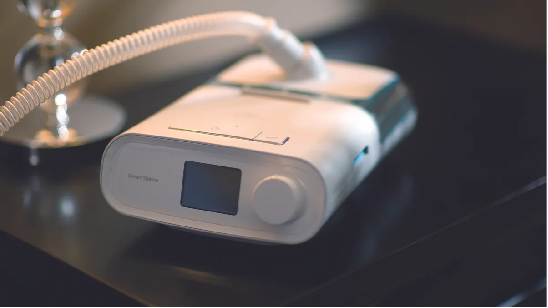Philips restricted from selling respiratory machines in DOJ consent decree
April 12, 2024
Source: drugdu
 301
301
 Dive Brief
Dive Brief
The Department of Justice filed a consent decree of permanent injunction against Philips on Tuesday in response to the company’s ongoing recall of sleep apnea and respiratory devices.
The settlement would restrict Philips from producing or selling new continuous positive airway pressure (CPAP) and bi-level positive airway pressure (BiPAP) machines and other devices in the U.S. until the company meets certain requirements. Philips also faces restrictions on exporting devices that are being provided to patients impacted by the recall “to help ensure remediation of U.S. patients is prioritized over export for commercial distribution.”
Philips is required to implement a recall remediation plan that the Food and Drug Administration must agree on, including providing patients with new or reworked devices, or a partial refund. Jeff Shuren, director of the FDA’s Center for Devices and Radiological Health, said in a Tuesday statement that the finalization of the decree is a “significant milestone.”
Dive Insight
Philips said in January that it had agreed to stop selling certain devices in the U.S. as part of a consent decree. Now, that agreement has been finalized and filed in the U.S. District Court for the Western District of Pennsylvania.
The consent decree primarily focuses on Philips Respironics’ U.S. operations, including its manufacturing facilities in Murrysville and New Kensington, service center in Mount Pleasant and the Respironics headquarters in Pittsburgh, all of which are located in Pennsylvania, spokesperson Steve Klink wrote in an email.
Attorneys told MedTech Dive in January that consent decrees are a significant step. The agreement gives the FDA a lot of power, and sets out clear mandates for companies to fix problems identified by the agency, often requiring years of compliance.
Philips began its recall of respiratory devices in June 2021, after the company found that foam used to soundproof the devices could break down and be inhaled by users, causing health risks. That recall now encompasses more than 15 million devices, according to the FDA’s database. Philips said it has remediated 99% of actionable sleep therapy device registrations, referring to devices where the company has the necessary information. The company’s remediation of ventilators affected by the recall is ongoing, Klink said.
The complaint alleged that Philips violated the Federal Food, Drug, and Cosmetic Act by selling devices that did not meet current good manufacturing practice requirements. The decree also alleged that Philips failed to provide the FDA with specific corrections made to devices, such as when the company added foam replacement to its preventive maintenance schedule for the devices in 2018, but didn’t disclose it until a 2021 inspection.
Another inspection of Philips’ Mount Pleasant facility in 2023 found further violations of good manufacturing requirements, according to the complaint. A facility in Carlsbad, California, found in violation of the requirements closed down in December 2022.
The injunction includes, “novel provisions aimed at helping ensure that patients receive the relief they have long deserved,” Shuren said. “This also marks the first time a device company is providing a remediation payment option for a recalled device under a consent decree.”
In addition to ceasing sales of respiratory devices, Philips must also contract with an independent testing expert within 10 days to evaluate the company’s testing of the previous foam and a new, silicone-based foam the company is using to replace or rework some of the affected machines.
The company must also retain an independent expert to inspect its sleep and respiratory care facilities, other than those in Pennsylvania and California, to evaluate whether they are complying with federal requirements and correct deficiencies.
The FDA said it is assessing the supply chain for these products and “believes there is adequate supply and that alternative manufacturers are able to handle patient demand for CPAP and BiPAP machines.”
Philips said that millions of patients in the U.S. use its sleep and respiratory care devices, and it will be allowed to continue servicing those devices and sell accessories and replacement parts. The company also plans to continue to provide new sleep and respiratory care devices, accessories and parts outside of the U.S., subject to the consent decree requirements, Klink said. The Respironics business generated global sales of about 1 billion euros in 2023.
Source:
https://www.medtechdive.com/news/philips-respironics-consent-decree-fda-sleep-apnea/712760/
Read more on
- Gusekirumab Injection Accepted by CDE, Multiple Pipelines Advancing Simultaneously March 4, 2026
- Yifan Pharmaceutical’s teriparatide injection has been accepted by the CDE (Center for Drug Evaluation), adding a new domestic player to the osteoporosis treatment field March 4, 2026
- //news.yaozh.com/archive/47318.html PD-1 sales surge March 4, 2026
- A major breakthrough! Roche’s oral BTK inhibitor achieves its third Phase III clinical trial victory, a game-changer in the multi-billion dollar MS (manufactured pharmaceuticals) market. March 4, 2026
- GB19 Injection Approved for Clinical Trials of Cutaneous Lupus Erythematosus March 4, 2026
your submission has already been received.
OK
Subscribe
Please enter a valid Email address!
Submit
The most relevant industry news & insight will be sent to you every two weeks.



